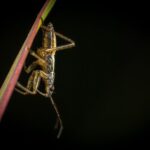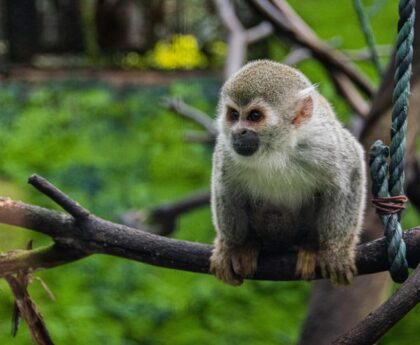The Emergence of the Asian Hornet in the UK: A Growing Threat to Native Bees
Introduction
Experts are increasingly concerned that the invasive Asian hornet (Vespa velutina) has become established in the United Kingdom. A record number of nests have been discovered this year, with a sharp rise in sightings of the species. While previous years had only two sightings each, 2023 has already seen 22 confirmed sightings. Since 2016, a total of 45 sightings have been reported, with the majority located in Kent. The potential establishment of the Asian hornet in the UK poses a significant threat to native bees, which they prey upon. Conservationists fear that once the hornets become established, it will be nearly impossible to eradicate them, leading to dire consequences for the already dwindling populations of insects in the country.
The Situation
The current strategy of the UK government is to locate and exterminate all Asian hornets and their nests in an attempt to prevent their overwintering and subsequent population growth. However, experts, such as bumblebee conservation expert Dave Goulson, believe that it is likely the hornets have already established themselves in Kent. Goulson warns that if even one nest manages to evade detection and reproduces, it may become impossible to prevent their establishment in the UK. Once established, eliminating Asian hornets would be extremely challenging. This is particularly concerning given the damage they inflict on native bee populations.
A Threat to Native Bees
Asian hornets are known to dismember and consume native bees. They position themselves near beehives, capturing bees as they enter and exit the hives. The hornets then tear apart the captured bees, feeding their thoraxes to their young. In France, where they have already become established, their predatory behavior has caused alarm due to the significant number of insects they prey upon. The arrival of the Asian hornet in the UK would introduce a new threat to already diminished insect populations, exacerbating existing pressures such as habitat loss and pesticide use.
The Impact and Outlook
Matt Shardlow, the chief executive of the insect charity Buglife, echoes Goulson’s concerns, stating that the recent discovery of four new Asian hornet nests, along with a concentrated cluster in coastal Kent, suggests that the species has colonized England. Shardlow notes that the Asian hornet poses a risk to biodiversity, particularly to wild solitary bee species. Although it is early to give up on control efforts, Shardlow emphasizes that swift action is necessary to prevent the colonizing of the hornets. The British Beekeepers Association trustee Julie Coleman shares these worries, suggesting that hornets may have already overwintered in Kent and dispersed hibernating queens in the autumn.
Trade and Transportation
Asian hornets first arrived in Europe in 2004, likely transported accidentally in cargo from Asia. Since then, they have rapidly expanded across western Europe and have now reached Britain, potentially via cargo or even through natural means like wind dispersal. Experts have recently raised concerns that the relaxed post-Brexit trade rules may be facilitating the colonization of the hornets. The European Union has banned the import of soil in pot plants from the UK, given the possibility of invasive species like the Asian hornet being concealed in soil. However, the UK has not reciprocated these bans, allowing potentially damaging species from the continent to be transported in soil.
Conclusion and Recommendations
The emergence and potential establishment of the invasive Asian hornet in the UK pose a serious threat to native bees and insect populations already under multiple pressures. The need for proactive measures is crucial to prevent their further spread. Efforts to identify and exterminate Asian hornet nests must be intensified, particularly in areas such as Kent where sightings have been concentrated. Additionally, stricter regulations should be implemented regarding the transportation of goods and soil to prevent the inadvertent introduction of invasive species.
Furthermore, increased investment in the preservation and restoration of habitats for native bees and other pollinators is urgently needed. By doing so, we can mitigate the impact of invasive species like the Asian hornet and provide a vital lifeline to struggling insect populations.
As the UK faces the potential establishment of the Asian hornet, it is imperative that the government, conservation organizations, and the public work collectively to minimize the impact on our native flora and fauna. The fate of our bees and the health of our ecosystems depend on it.

<< photo by Artem Balashevsky >>
The image is for illustrative purposes only and does not depict the actual situation.
You might want to read !
- Angela Rayner Takes Charge: Labour’s Shadow Secretary of Levelling Up
- Selena Gomez, Prince Harry, and a Galaxy of Celebrities Gather for a Spectacular Event
- Culinary Delights Unite: Glasgow Chef Julie Lin Joins Forces with Dame Judi Dench for BBC Appearance
- Wout Van Aert Reveals Insights on his Tour of Britain Journey
- Iwobi’s Move to Fulham: A Game-Changer for the Club’s Ambitions
- Kasper Schmeichel’s Contract Turmoil: An Unraveling Saga of Negotiations and Consequences
- Angela Rayner: Overcoming the Odds as a Labour Powerhouse
- Smash Mouth’s Steve Harwell: Navigating the Difficult Journey towards Hospice Care
- Rock Icon Steve Harwell of Smash Mouth Enters Hospice Care: A Difficult Farewell to a Musical Legend
- “The Rematch: Liam Smith vs Chris Eubank Jr 2 – Live Updates, Predictions, and Ringside Analysis”
- “The Rematch Rivalry: Expert Predictions for Liam Smith vs Chris Eubank Jr II”
- “The Highly Anticipated Rematch: Chris Eubank Jr vs Liam Smith 2 – A Battle of Champions”
- The Growing Threat: Assessing the Increasing Terrorism Risk in the UK




